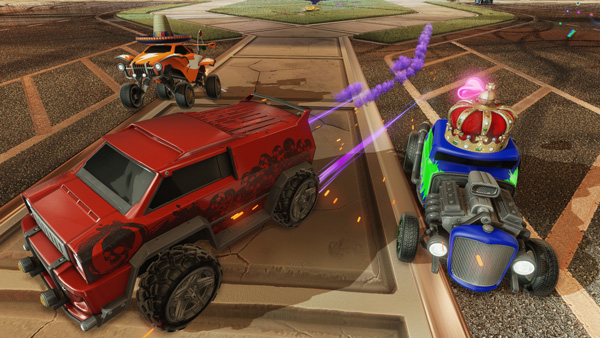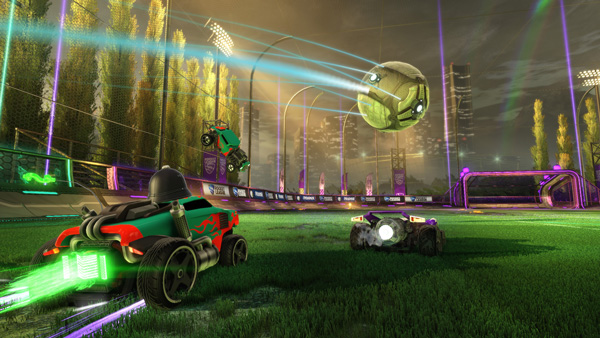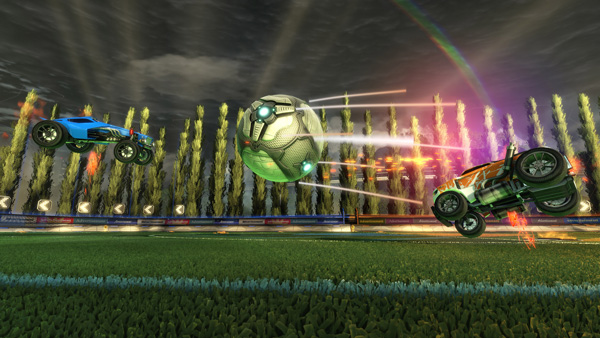G2A Pick of the Week: Rocket League
July 31 2015
Every week, Team Liquid will supply you with their pick for the G2A Game of the Week, which you can buy at an extremely discounted rate thanks to the G2A Weekly Sale. This week, we’ve chosen the modern competitive craze, Rocket League. You can get it right now at www.g2a.com/weeklysale for $19.14, a whopping 12% off its usual price.
Review: Rocket League
I’ve never played a game that needed virtually no explanation. Soccer, football, wendyball –whatever you want to call it-- it’s that, but on wheels. Drive car at giant ball; hit ball into net; score points. Rocket League’s competitive core has existed for centuries, and this helps make a preposterous concept feel primal. This, in turn, is a laughable way of describing a game.
Driving is delicious and cars ease around like butter in a heated pan, but always feel under your control. You accumulate boost by driving over markers on the arena floor and unleash it is a thunderous rush that fires you across, over and around the pitch. Because matches take place in smooth, enclosed spaces, you can drive up walls and across ceilings. Cars can also jump and dodge, both of which can be used defensively and offensively. The weight of the cars, as well as your ability to apply unruly boost to jumps, adds a pleasingly haphazard element.
Vehicles feel light and buzzy. This contrasts nicely with the fat, beefy bounce of the ball. I feel almost guilty reducing a review to ‘ball’ and ‘car’, but there are only ever those two things in the field of play, and crucially, they both feel great. It’s helped by a crisp, intuitive camera. You can focus on the ball, effortlessly whizzing around with it always in view, or switch to the standard camera - very useful for rushing back to defend your goal, or smashing into other vehicles. There are no weapons, but certain markers fill your boost and let you obliterate other players. Mercifully, it’s the generous, instantly-respawning type of obliteration. Destruction is the only conspicuous deviation from clean business of driving around and scoring goals, but in most of the games I played it was a rarity—certainly never frequent enough to be irritating.

Destroying other vehicles is one of many actions which accumulates points; imagine Burnout, but with awards for skill not speed. Giving everything a points value means it’s about more than scoring goals. The most valuable players I encountered were workmanlike wingers who selflessly chugged along the the flanks, crossing the ball for greedy goal hunters like me. It stops players from clustering in the same spots and reinforces the concept that Rocket League is a team game.
Except, of course, when it’s not, such as when you’re dueling against a single opponent. Alternatively, you can set teams of four against each other, in matches which become so frantic.
Playlists of duels, doubles, standard 3v3 matches and the appropriately named Chaos 4v4 mode are all available online, with ranked playlists limited to duels, doubles and 3v3. There’s a reason why online play is the first option on the menu: Rocket League is designed to be played with actual people, and this is absolutely where it thrives. My experience was marvelously robust. I rarely had to wait long for a game, and if players dropped out mid-session they were immediately replaced by AI bots. Best of all, it’s refreshingly simple to get back into another game, so very little time is spent lingering in lobbies.

If playing online isn’t your thing, there are exhibition matches and full seasons you can solo. The length and difficulty can be altered, and while it doesn’t offer much in the way of depth—cars and football, remember?—I still found myself bonding with pretend teammates. Whether online or offline, playing games randomly unlocks new cars and upgrades. These range from simple things like fresh coats of paint and shiny wheels, to pointy hats for your wizard mobile. Upgrades are purely cosmetic, but volume, variety and the promise of driving around with bubbles frothing from your exhaust should be enough to keep you coming back.